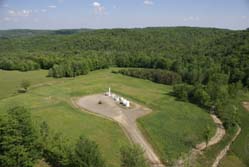
The House of Commons Energy and Climate Change Committee published its report on shale gas last night, concluding that fears over the safety of shale gas exploration in the UK are largely unfounded.
24 May 2011
‘There has been a lot of hot air recently about the dangers of shale gas drilling’ said Committee Chair Tim Yeo.
‘Our inquiry found no evidence to support the main concern – that UK water supplies would be put at risk.’
The enquiry found no evidence that ‘fracking’ – the hydraulic fracturing process involved in shale gas extraction – put underground aquifers at risk, provided the drilling well is properly constructed.
The Geological Society has welcomed the report, particularly given the present level of public concern about the safety of shale gas exploration.
Responding to the report, Geological Society President Dr Bryan Lovell said, ‘the hydrocarbon industry has an excellent record of collaboration with national and local authorities to ensure high levels of protection for human health and the environment.
‘There is every reason to believe that this successful collaboration will continue in our exploration for shale gas, and its possible eventual production.’
With onshore reserves estimated by the British Geological Survey as 150 billion cubic metres, valued at around £28 billion, the UK is increasingly interested in the potential for shale gas to reduce dependence on imported gas.
However, the report suggests that onshore resources alone as unlikely to have a dramatic impact on the UK’s energy security.
‘Offshore reserves may be much higher’ Tim Yeo added, ‘and, while more costly to recover, could potentially deliver self-sufficiency in gas for the UK at some point in the future.’
The Committee called on the Government to encourage the development of the offshore shale gas industry in the UK.
It also took steps to allay the concerns of environmentalists, pointing out that greenhouse gas emissions from gas are lower than those from coal. And in response to concerns over YouTube videos apparently showing people in the US setting fire to tap water as a result of methane leaks, Yeo stated:
‘Regulations in the UK are stronger than in the States and should stop anything of the sort from happening here.’
However, the Committee pointed out that shale gas is not in itself sufficient to meet long term emissions reduction targets and mitigate the effects of global warming, with greenhouse gas emissions from the gas still much higher than from low carbon technologies such as nuclear, solar or wind power.
‘If it has a downward effect on gas prices it could divert much needed investment away from lower carbon technologies like solar, wind, wave or tidal power’ said Yeo. ‘The emergence of shale gas increases the urgency of bringing carbon capture and storage technology to the market and making it work for gas as well as coal.’